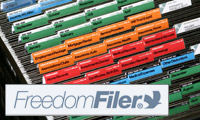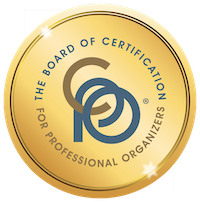Filing those paid bills
Do you hang on to the paper bills that your creditors send you after you pay them? (Do you even receive your bills in the mail anymore?) A certain percentage of my clients have either gone paperless or automatically shred the bills after paying.
But a larger number of clients (and my family as well) receive most of their bills in the mail and hang on to the paid bills for at least awhile. Most of those clients, at the time I meet them, are doing what I used to do: they’re filing the paid bills by payee. (All the electric bills together, all the credit-card bills together, etc.) Or, more accurately, they’re letting the paid bills pile up because it’s such a pain to file them by payee. (I used to do that, too!)
What I recommend — and I got this idea from Freedom Filer — is instead of filing paid bills by payee, file them by month paid. Freedom Filer has labels for odd year and even year months, which allows you to keep a two-year backlog. (That’s what I do.) But a one-year backlog for non-tax-related documents is almost certainly sufficient.
Here’s what you do:
- Label a dozen hanging file folders, one for each month of the year.
- Create another hanging file folder (or folders) for tax-related documents.
- When you pay bills, separate out any that can serve as documentation for a tax deduction. (This is particularly important for those of us who write off home offices.) Put those in the tax file.
- Drop the rest of the papers in the file corresponding to the month in which you’re paying them.
- After you’ve done this for a year, you’ll find the monthly file full of last year’s bills when you go to file. Simply pull out the contents and shred them. Drop the current month’s bills into the file, where they’ll stay for a year.
It’s that simple! I also put my receipts (again, non-tax-related) in the monthly files, as well as bank statements from my husband’s and my joint checking account. I’ve been doing this four about four years now and have yet to have it cause any problems. I so very rarely need to find anything in the files, but when I do it’s not difficult to find.
One note about tax-related documents: If you don’t keep track of your expenses electronically, you might want to create a series of category-related tax files to make it easier at tax time. Or just do a big sort at tax time.
This method of filing paid bills is so much less time consuming than filing by payee that the “To File” pile becomes a thing of the past. If you’re hanging on to your paid bills, I urge you to give it a try.
Tagged with: filing systems, freedom filer, paid bills
Comments
Very helpful! We do get a lot of bills via email. What should I do with those email bills? How necessary is it really to keep non-tax-related bills, even for a year?
Mary A August 1, 2013 09:47 AM
Mary, it’s not necessary to keep the non-tax-related bills after you pay them. Go ahead and shred with abandon! A lot of my clients like to keep them for reference, but most don’t refer to them. As far as the email bills go, you can either delete them (if they’re not tax-related) or file them within your email program. No need to print out!
Janine Adams August 1, 2013 01:14 PM
Thank you soo soo much!! I, on the other hand, am a filing freak. I have been filing all of my bills in an envelope by month just because they fit better into a shoe box. Now I happen to have two years worth and have wondering if its even necessary…You just gave me “peace of mind” and a much better system to go by. Yes!! I’m excited to start SHREDDING! Blessings from Pennsylvania
AMBAR HERNANDEZ February 23, 2017 06:38 AM
Links
- Ravelry
- National Association of Productivity and Organizing Professionals
- Are you interested in becoming a professional organizer?
- Institute for Challenging Disorganization
- Getting to Good Enough podcast
- NAPO St. Louis
- Organize Your Family History
- Shannon Wilkinson, life coach
- Metropolitan Organizing







Guilty. I’m the kind that still keep my bills piled up. After I pay any bill I tell myself, “I should hold on to this, just in case.”
I am trying to sign up to receive my bills through email which seem a lot more convenient.
This FreedomFiler seems to come in handy though! I might switch back to receiving live bills instead of through email.
Mark A. Morales October 27, 2011 12:31 PM